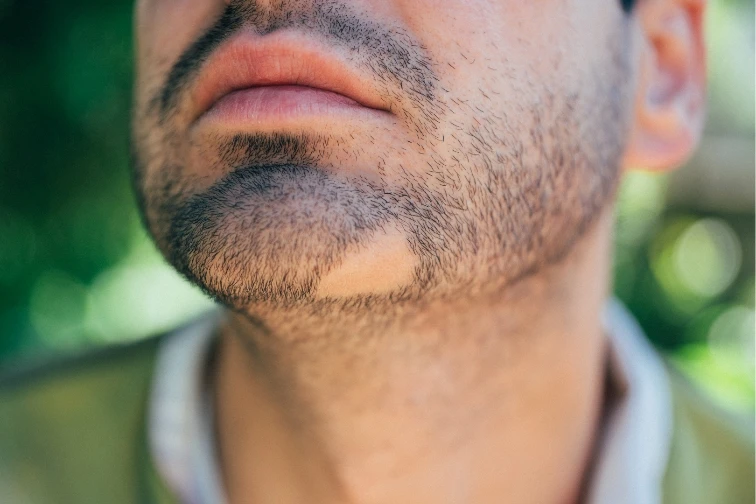Causes and treatment options for affected men
A thick, well-groomed beard has become an integral part of many men's lives - but it is just as hard to take for granted. This is because thinning or bald patches often appear, which can be very stressful for those affected. Depending on the cause, however, effective measures and treatment options are available.
Unwanted hair loss - this can affect more than just the hair on the head. Unwanted bald patches also occur in the beard area. This hair loss (alopecia barbae) is considered a subtype of circular hair loss (alopecia areata).
However, men need not immediately worry if a few beard hairs are constantly found in the waxing basin. As with head hair, the following also applies to the beard area: daily, moderate loss is normal: up to 50 hairs that have fallen out are normal. They grow back and are therefore not a sign of illness.

Only men who have visible bald patches on their cheeks, face or neck should take notice. Then it is important to investigate the cause: Does the hair loss have harmless causes or is it due to an illness? What can be done about the bald patches also depends on the cause.

Hair breakage due to mechanical stimuli: Some men consciously or unconsciously play with their facial hair. They twirl their beard hair with their fingers or pluck at it, lost in thought. However, the beard is not as robust as it appears! All of this can cause hair breakage or irritate the hair root. The result: no new beard hair is produced and the root dies off. So keep your hands off your beard!
Shaving: The hair roots can also be damaged by blunt razor blades, which no longer cut the hairs cleanly at the surface, but tear them or injure the skin.
Incorrect care: Sensitive hair roots are stressed by normal soap or hair shampoo, as the skin on the beard is dry rather than greasy. In this case, special beard shampoos that add moisture instead of removing it help.
Aggressive care products (including pomade) with kerosenes, silicones or parabens also tend to have a damaging effect on beard growth.
Stress or stressful phases can lead to hair and beard loss, as they have an unfavorable effect on the hormone status in the body. In this case, relaxation and mental balance are needed to solve the hair problem.
Testosterone deficiency can also lead to hair loss. A possible imbalance can be determined via a blood test and treated by a doctor if necessary.
Two common forms of hair loss can affect the beard area as well as the hair on the head. On the one hand, this applies to hereditary hair loss. This is also known as androgenetic alopecia, which typically begins with a receding hairline and hair loss on the forehead, temples and upper back of the head (in women in the area of the middle parting). This is mainly caused by the body's own hormone DHT (dihydrotestosterone). Hair follicles react hypersensitively to this, shrink or atrophy. As a result, hair growth is reduced or comes to a standstill.
Circular hair loss (alopecia areata) can also affect the hair on the head as well as the beard or eyebrow area - and usually occurs suddenly. The severity varies from person to person and ranges from one or a few very small bald patches to complete hair loss. An autoimmune reaction could be responsible, as could parameters such as lifestyle, diet, hormonal changes and stress. Ultimately, however, the cause is unclear. A reliable diagnosis should be made by a doctor.

The hair follicles in which the hair grows are among the most actively dividing tissues in the body and have an active metabolism. In addition to protein, they also need micronutrients such as vitamins (especially biotin, vitamin C and the B vitamins) and minerals such as zinc and iron: Only an adequate supply of nutrients - especially through a wholesome, varied diet - ensures dense beard growth.
Care products with thymus extracts can also promote the formation of new hair. This is because studies have shown that thymus peptides have the ability to optimize the cell supply to the hair follicles and thus stimulate the development of new hair cells.
Thymuskin contains the patented active ingredient GKL–02 Thymic Peptide Complex. The biological activity of thymuskin is particularly evident in the activation of hair cells (keratinocytes), which have a decisive influence on hair growth. Hair formation is stimulated.

Alopecia androgenetica
The technical term alopecia androgenetica refers to hereditary hair loss.
Alopecia Areata
In the case of alopecia areata, demarcated bald patches form as the disease progresses.